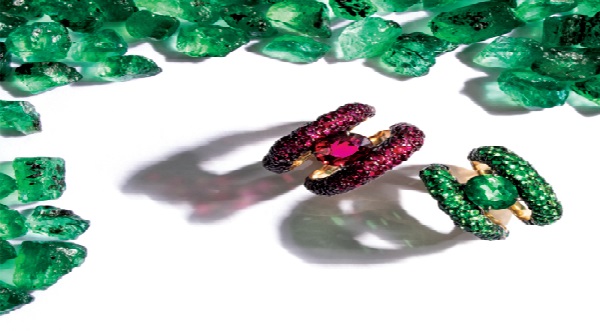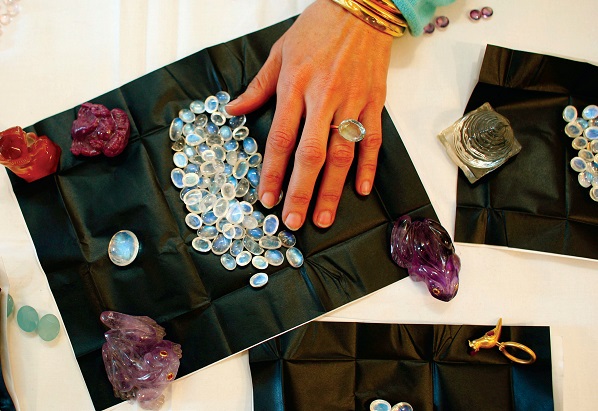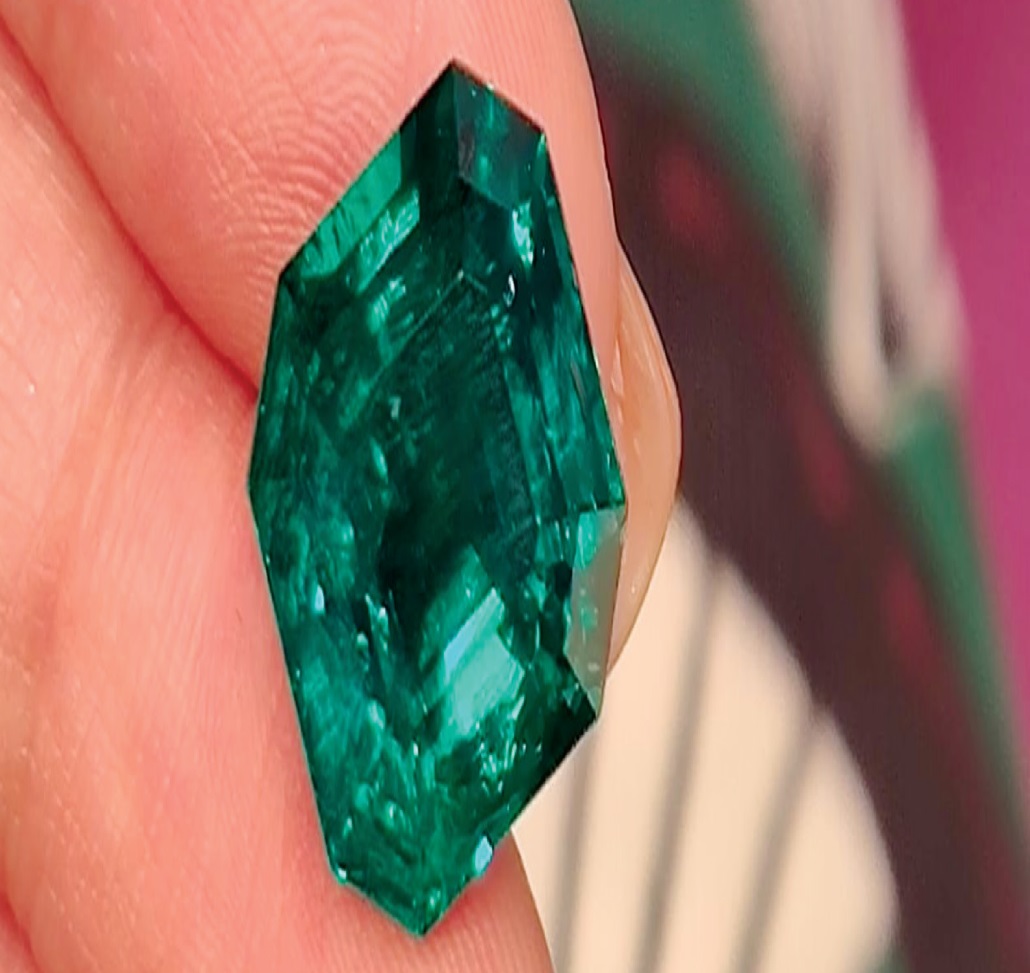glorious industry, resplendent in colour gemstones in myriad hues, is experiencing the vicissitudes that coronavirus has brought with it. With almost no business in the months of March & April, the industry is slowly starting to regain its strength; one gemstone at a time says Vijetha Rangabashyam

In April-August alone exports of coloured gemstones dipped by 63 per cent as compared to the same period last year. Large trade shows have been cancelled, postponed or replaced by virtual ones. Virtual world has its own limitations – for colour gemstone trade that is already very fragmented and not streamlined, doing virtual business is not that easy. Businesses are highly touch and feel oriented; however, gemstone dealers are grappling with the changes and are hopeful that things will get better.
The post-pandemic effect
India is the largest exporter of coloured gemstones in the world. After the pandemic, the market for coloured gemstones has been hit badly. The problems are multiple and multipronged. Supply chain is a problem and there are no buyers in the market, both domestically and internationally. Not like what it used to be anyway. “We don’t have supply of coloured stones and there are no buyers for cut stones. There is no demand from markets in Europe and USA. We cannot import roughs because there are no flights. We are not getting any parcels here and the fact that there are no trade shows happening anywhere in the world is also affecting the business badly,” says Arun Gokhroo of AG Gems. Like other industries, business was nil from end of March till May. Work has resumed in factories with 50 per cent capacity since June. “The demand for Tanzanite, semi precious stones and emeralds has been reduced to 50 per cent. In the coming three-four months this situation is likely to be same. Thereafter till about six months, there could be a shortage of raw materials. Small manufacturers have shut shop, and there’s no chance of them reopening any time soon,” says Nirmal Bardiya of RMC Gems.
The demand for Tanzanite, semi precious stones and emeralds has been reduced to 50 per cent. In the coming three-four months this situation is likely to be exactly the same. Thereafter till about six months, there could be a shortage of raw materials. Small manufacturers have shut shop, and there’s no chance of them reopening any time soon Nirmal Bardiya, RMC Gems
Supply chain havoc
Supply chain and logistics hasn’t been an issue for some gemstone dealers as they have been managing with their existing stock. The real litmus test will be after December. “If by December the supply still doesn’t resume, then there will be a shortage of coloured gemstones,” adds Bardiya. Things became a little easy as a few flights started resuming towards the end of May, especially the Vande Bharat mission flights helped gemstone dealers carry their freights. This led to export markets ordering goods and pre-ordered goods were delivered as well. “Supply chain still remains an issue. Production of new goods has almost stopped. No one wants to get into a liquidity crisis during these times and hence don’t want to commit to procuring new material. Transportation time and costs have surged when sending goods from a city like Jaipur. For example, if I need to send goods to Paris, shipments are being re-routed through New York,” said Dharmendra Tank of Heeralal Chhaganlal Tank. European markets have just now resumed after a long summer break, and since many cities are subject to a second wave of the virus, they too are clamped up with many restrictions. “Supply from the mines are nil. People are also not able to travel and source merchandise. But they are holding onto their goods as they believe that market prices will stay the same,” says Ratnesh Tambi of KL Tambi & Co.
We don’t have supply of coloured stones and there are no buyers for cut stones. There is no demand from markets in Europe and USA. We cannot import roughs because there are no flights. We are not getting any parcels here and the fact that there are no trade shows happening anywhere in the world is also affecting the business badly Arun Gokhroo, AG Gems

Digital to the rescue
Traditionally, the colour gemstone business is an industry where transactions happen through touching and feeling the stone, scrutinizing the gemstone through a loupe is just how things work. However, with tradeshows being cancelled, gemstone dealers are finally beginning to see the benefits of having
a digital presence. “We tried to connect with customers over Whatsapp or email or videocalls. But they want to see the stones in person. Customers want to inspect the stones before buying,” quips Tank. However, trusted behemoths of the colour gemstone industry who have a wide network of clients overseas have really pinned their hopes on online sales. “We have fully utilized channels like Whatsapp, WeChat and other social media channels. We are taking the ecommerce route very seriously. We are investing more towards taking good product photography, so that the real product is almost similar to what is there in the pictures. We have to adapt to the new changes to stay relevant in the future. There will be challenges because our industry is based on touch and feel, but then if it means that we need to use the logistics companies more to send the goods, we have to do that. Clients can keep what they like and send the rest back,” affirms Tambi.
Karigars migrating to other sectors
Karigars involved in cutting and polishing colour gemstone are local, unlike in the jewellery industry. “It has not been an issue as such however, many of them are migrating to other sectors and this could lead to a serious shortage in manpower in the future. When the demand starts trickling in, lack of labour will be a definite issue,” says Bardiya. However, migration of work force hasn’t been a dire concern for the colour gemstone industry in Jaipur. “We specialise in cut stones, my workers have started coming back to work. In terms of cutting and polishing business, migrant labour problem is not an issue,” says Tank.
Supply chain still remains an issue. Production of new goods has almost stopped. No one wants to get into a liquidity crisis during these times and hence don’t want to commit to procuring new material. Transportation time and costs have surged when sending goods from a city like Jaipur. For example, if I need to send goods to Paris, shipments are being re-routed through New York Dharmendra Tank, Heeralal Chhaganlal Tank

High-end stones on a high note; commercial variety sees no respite
The rare, one-of-a-kind stones are doing well despite the current state of affairs. “Demand for high-end stones are intact. Those who had contacted me before the pandemic followed through and bought high-end merchandise. The rare items are still popular in the overseas market. Commercial quality stones have been affected for sure. Normally rare varieties of stones are only bought by collectors. They have already seen the goods and they trust the laboratories and certification and digitization has only made the process easier,” adds Tambi. Currently, U.S. and China are showing great interest towards colour gemstones, especially emerald and sapphire. However, supply chain constraints are delaying shipments. “Market trends have also changed as demands are very specific and customers are highly selective. But the biggest problem still remains transportation and we don’t know how this season will play out. Gemstones need certifications, and we used to send stones to major laboratories to get them certified. The whole process used to take around ten days but the turnaround time from the labs has also increased. All the major coloured stones: Emeralds, Rubies and Sapphires are still moving at a fast pace. The very fine grade stones and even the smaller sized stones are doing very well,” says Tank.
The industry needs Government to step-up
Government’s support comes a long way, especially during crisis. The colour gemstone industry to retain its stance as one of the important hubs in the world needs policies that are conducive. “The government is not helping at all, because the import of rough gemstones is stuck, we face a lot of harassment from officers,” adds Gokhroo. The Council and trade bodies are constantly working towards resolving issues regarding policy matters. “Owing to GST, and new imposition of TCS (tax collected at source for foreign remittances), a lot of working capital is getting blocked. GST is also a major issue,” adds Tank.
Many countries including Hong Kong and U.S. are doing a lot to help revive the gems and jewellery industry. “Government should give us tax benefits. There needs to be liquidity to run the business. The U.S. government has done a lot for their businesses like paying rents, salaries etc. Government should give businesses at least 3-6 months salaries, which they can in turn pay their staff. And banks should be allowed to give more credit to this industry,” adds Tambi.
No signs of improvement till Chinese New Year
Most gemstone dealers believe that any semblance of normalcy will creep in after March 2021 and for the market to get back its health, it would take anywhere between 1 to 1.5 years. “We need to pass this financial year with patience – till about March ending, you need to be careful and sensible in doing business. Do not send out large shipments, because any part of the world can come under lockdown. By second quarter next year, business should be back to normal,” says Tank. A lot is pinned on when a vaccine will come into play and whether or not we will have a vaccine at all. “I don’t see anything going back to normalcy before the Chinese New Year. We will get more clarity in March 2021.”
Government should give us tax benefits. There needs to be liquidity to run the business. Government should give businesses at least 3-6 months salaries, which they can in turn pay their staff And banks should be allowed to give more credit to this industry Ratnesh Tambi, KL Tambi & Co
Be the first to comment